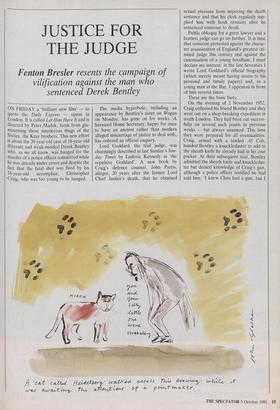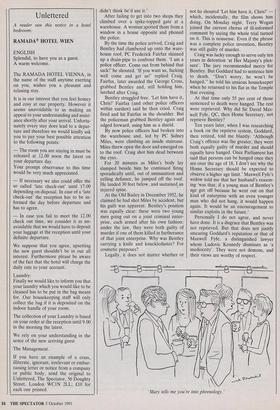JUSTICE FOR THE JUDGE
Fenton Bresler resents the campaign of
vilification against the man who sentenced Derek Bentley
ON FRIDAY a 'brilliant new film' — to quote the Daily Express — opens in London. It is called Let Him Have It and is directed by Peter Madek, fresh from gla- mourising those murderous thugs of the Sixties, the Kray brothers. This new effort is about the 39-year-old case of 18-year-old illiterate and weak-minded Derek Bentley who, as we all know, was hanged for the murder of a police officer committed while he was already under arrest and despite the fact that the fatal shot was fired by his 16-year-old accomplice, Christopher Craig, who was too young to be hanged. The media hyperbole, including an appearance by Bentley's sister on Wogan on Monday, has gone on for weeks. A harassed Home Secretary, happy for once to have an ancient rather than modern alleged miscarriage of justice to deal with, has ordered an official enquiry.
Lord Goddard, the trial judge, was charmingly described in last Sunday's Sun- day Times by Ludovic Kennedy as 'the repulsive Goddard'. A new book by Craig's defence counsel, John Parris, alleges, 20 years after the former Lord Chief Justice's death, that he obtained
sexual pleasure from imposing the death sentence and that his clerk regularly sup- plied him with fresh trousers after he sentenced someone to death.
Public obloquy for a great lawyer and a fearless judge can go no further. It is time that someone protested against the charac- ter assassination of England's greatest cri- minal judge this century and against the canonisation of a young hoodlum. I must declare my interest: in the late Seventies I wrote Lord Goddard's official biography (which merely meant having access to his personal and family papers) and, as a young man at the Bar, I appeared in front of him several times.
These are the basic facts: On the evening of 2 November 1952, Craig collected his friend Bentley and they went out on a shop-breaking expedition in south London. They had been out success- fully on several such jaunts in previous weeks — but always unarmed. This time they were prepared for all eventualities: Craig, armed with a loaded .45 Colt, handed Bentley a knuckleduster to add to the sheath knife he already had in his coat pocket. At their subsequent trial, Bentley admitted the sheath knife and knuckledus- ter but denied knowledge of Craig's gun, although a police officer testified he had told him: 'I knew Chris had a gun, but I didn't think he'd use it.'
After failing to get into two shops they climbed over a spike-topped gate at a warehouse. A woman spotted them from a window in a house opposite and phoned the police.
By the time the police arrived, Craig and Bentley had clambered up onto the ware- house roof. PC Frederick Fairfax shinned up a drain-pipe to confront them. 'I am a police officer. Come out from behind that sack!' he shouted. 'If you want us, fucking well come and get us!' replied Craig. Fairfax, later awarded the George Cross, grabbed Bentley and, still holding him, lurched after Craig.
Bentley struggled free. 'Let him have it, Chris!' Fairfax (and other police officers within earshot) said he then cried. Craig fired and hit Fairfax in the shoulder. But the policeman grabbed Bentley again and edged forward, using him as a shield.
By now police officers had broken into the warehouse and, led by PC Sidney Miles, were climbing an inside staircase. Miles threw open the door and emerged on to the roof. Craig shot him dead between the eyes.
For 20 minutes as Miles's body lay slumped beside him he continued firing sporadically until, out of ammunition and yelling defiance, he jumped off the roof. He landed 30 feet below, and sustained an injured spine.
At the Old Bailey in December 1952, he claimed he had shot Miles by accident, but his guilt was apparent. Bentley's position was equally clear: these were two young men going out on a joint criminal enter- prise, each armed after his own fashion: under the law, they were both guilty of murder if one of them killed in furtherance of that joint enterprise. Why was Bentley carrying a knife and knuckleduster? For cosmetic purposes?
Legally, it does not matter whether or not he shouted 'Let him have it, Chris!' — which, incidentally, the film shows him doing. On Monday night, Terry Wogan joined the current chorus of ill-informed comment by saying the whole trial turned on it. This is nonsense. Even if the phrase was a complete police invention, Bentley was still guilty of murder.
Craig was lucky enough to serve only ten years in detention 'at Her Majesty's plea- sure'. The jury recommended mercy for Bentley. But Goddard had to sentence him to death. "Don't worry, he won't be hanged," he told his anxious housekeeper when he returned to his flat in the Temple that evening.
At that time only 55 per cent of those sentenced to death were hanged. The rest were reprieved. Why did Sir David Max- well Fyfe, QC, then Home Secretary, not reprieve Bentley?
Ten years later, when I was researching a book on the reprieve system, Goddard, then retired, told me bluntly: 'Although Craig's offence was the greater, they were both equally guilty of murder and should equally have hanged. Once Parliament has said that persons can be hanged once they are over the age of 18, I don't see why the Home Secretary should be expected to observe a higher age limit.' Maxwell Fyfe's widow told me that her husband's reason- ing 'was that, if a young man of Bentley's age got off because he went out on that kind of enterprise with an even younger man who did not hang, it would happen again. It would be an encouragement to similar exploits in the future.'
Personally I do not agree, and never have done. It is a disgrace that Bentley was not reprieved. But that does not justify smearing Goddard's reputation or that of Maxwell Fyfe, a distinguished lawyer whom Ludovic Kennedy dismisses as 'a mediocrity'. They were not demons, and their views are worthy of respect.
'Mary tells me you're into phrenology.'



















































 Previous page
Previous page